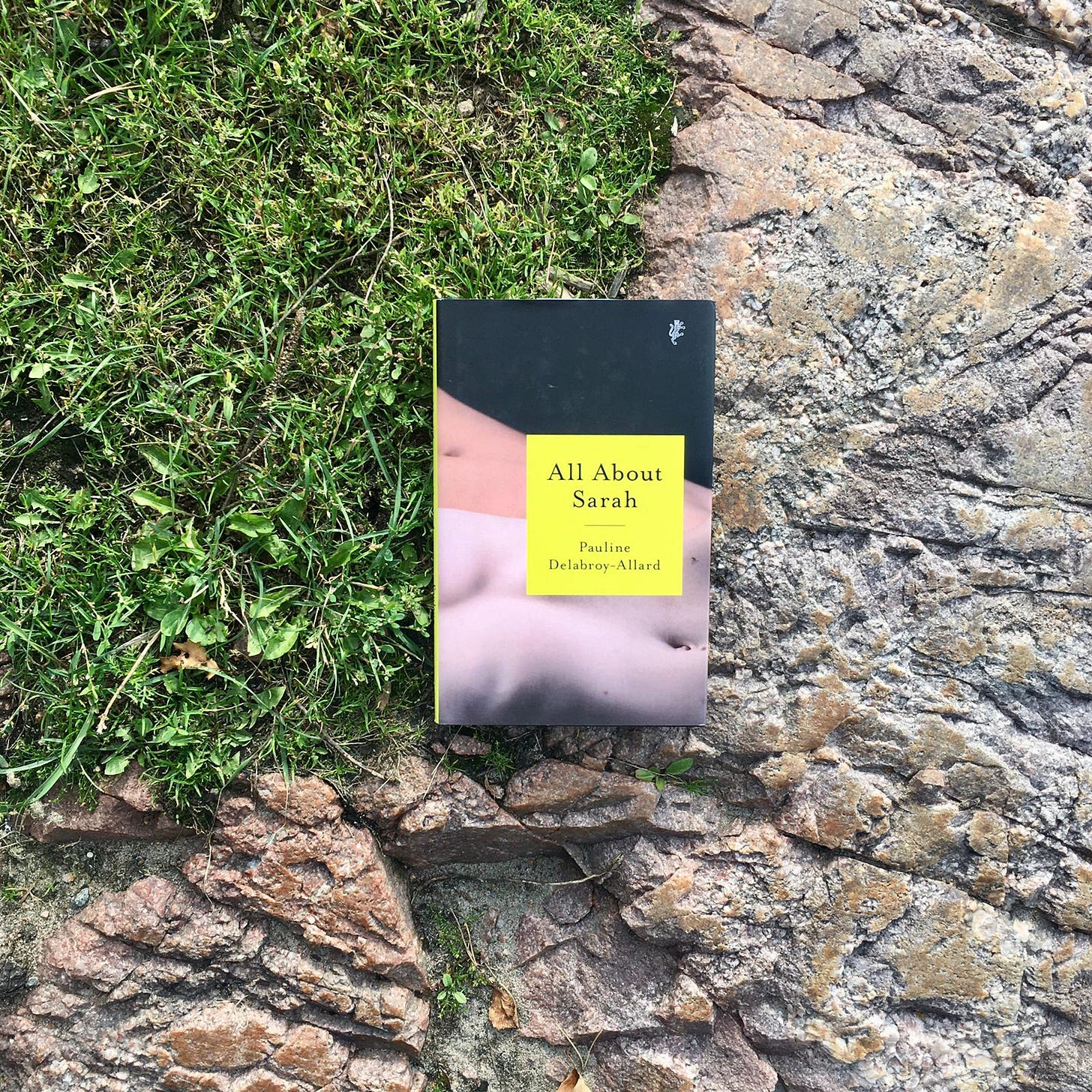Welcome to Bookmarked, a weekly newsletter following my journey as I read one book from every country. If you like the sound of my project, I’d love it if you shared Bookmarked with a friend.
With so many fantastic sounding French novels to choose between, it was difficult to pick just one. In the end I opted for Pauline Delabroy-Allard’s All About Sarah, the author’s debut novel which was shortlisted for the Prix Goncourt and which I came across in a Guardian feature profiling contemporary European novelists.
All About Sarah is a story about passion and obsession. Its unnamed narrator is an ordinary secondary school teacher and single parent who snaps out of her semi-permanent state of latency when she meets a professional violinist called Sarah at a dinner party. “What a weird girl,” says the narrator’s partner. But the narrator is immediately transfixed, walking out on her relationship and embarking upon an all-consuming love affair with Sarah.
“It’s all about Sarah, her unique brand of beauty, her sharp, rare bird’s beak of a nose, the unusual colour of her eyes, stone-like, green, but not really, not green, her absinthe, malachite, faded grey-green eyes, her snake eyes with their drooping lids. It’s all about the spring when she came into my life as if stepping onto a stage with gusto, triumphant. Victorious.”
The 165-page novel is divided into two stylistically disparate halves, of which the first details the early days of the narrator’s relationship with Sarah. Delabroy-Allard employs simplistic language, plenty of repetition, and short chapters (the first half of the novel is made up of 82 chapters spanning just 83 pages) to embody the narrator’s perception of her impulsive and passionate lover. On the whole Hunter’s translation is effective, though a few of her words and phrases stood out to me as awkward (“snatch” as synonym for vagina made me cringe). In this half of the book, almost every sentence is an observation about Sarah or a description of the narrator’s physiological state when she’s around her.
When Sarah is diagnosed with a terminal illness the novel’s pace shifts somewhat. The book’s second half comprises longer sentences and chapters, as the narrator goes travelling and becomes convinced that Sarah’s illness is a direct consequence of their love. We see the narrator go down a path of fervent self-destruction, withdrawing into her mind and tormenting herself with thoughts about the events in her life that have led her to this point.
“I’m well aware that I’m losing my memory, that I don’t know what day it is, that I’ve forgotten what happened that night. I sing myself nursery rhymes from my childhood, to get my memory to work. I recite the names of members of my family as if telling a rosary. I sing old French variety songs that I can still remember.”
It is a common cliché that stories about lesbians almost always involve death and unhappy endings, and it’s a shame that All About Sarah also treads this path. I won’t spoil the ending but I will say that Sarah’s fate is by no means the most interesting thing about Delabroy-Allard’s novel. Despite its title, All About Sarah is actually about the narrator as she retreats into the darkest corners of her mind, fuelled by a frenzied attempt to break the monotony of her life. Delabroy-Allard’s ability to inhabit one woman’s single-minded pursuit of another is nothing if not absorbing and her unblinking portrayal of the narrator’s obsession with Sarah succeeds in capturing the essence of a short, paradigm-shifting relationship.
At the same time, I couldn’t help but wish that Delabroy-Allard had allowed her narrator’s relationship with Sarah to move beyond the intensity of early infatuation and coping with terminal illness. I was left curious about what would have happened when the narrator’s life returned to normal, with Sarah in it.
All About Sarah by Pauline Delabroy-Allard, translated by Adriana Hunter (Harvill Secker, 2020 / Les Éditions de Minuit, 2018)
More books from French authors
Here’s a list of the recommendations I received this week. I read Winter in Sokcho earlier this year and have been desperate to go to South Korea ever since.
The Wondrous and Tragic Life of Ivan and Ivana by Maryse Condé, tr. Richard Philcox
Pig Tales by Marie Darrieussecq, tr. Linda Coverdale
The Revolt by Clara Dupont-Monod, tr. Ruth Diver
The Years by Annie Ernaux, tr. Alison L. Strayer
Billie by Anna Gavalda, tr. Jennifer Rappaport
Mend the Living by Maylis de Kerangal, tr. Jessica Moore
The White Dress by Nathalie Léger, tr. Natasha Lehrer
Ladivine by Marie NDiaye, tr. Jordan Stump
Faces on the Tip of my Tongue by Emmanuelle Pagano, tr. Sophie Lewis and Jennifer Higgins
Winter in Sokcho by Elisa Shua Dusapin, tr. Aneesa Abbas Higgins
What have you read recently?
If you’ve read a brilliant book in translation or want to pass on a recommendation, I’d love to hear about it! For this project, I’m focussing on contemporary fiction and short stories, with a preference for female authors—but I won’t be too dogmatic about it so do share recommendations that don’t quite fit the bill, too.
You can get in touch by replying to this email or leaving a comment. I’ll be featuring your recommendations in upcoming newsletters, and I’ll keep a growing list here.
Bookmarked is written by Tabatha Leggett. Thank you to Ben Dalton, Laura Kaposi, and Mathias Rambaud from Institut français for their recommendations for this issue. If you’ve been forwarded this email and you enjoyed it, you can subscribe below.




